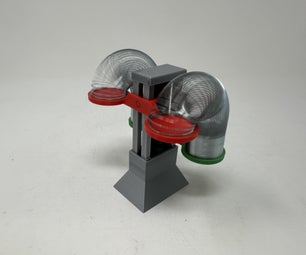Introduction: Simple DIY Magnetic Stirrer
This is one of those projects that seems like it would be hard, but actually ends up being way easier than you'd think, and it works amazingly well. You can see in the video below that it stirs extremely well.
Unfortunately, this is also one of those projects that seems more complicated when written down, so please, look at the video/pictures to get a much more intuitive understanding!
I had to reupload the video, so if you could like it on YouTube it would really help me out!
Supplies
- Small DC motor (I used a 5V one)
- Any cuttable material (wood, foam, etc. I used blue foam)
- Battery box (I used the one from a broken set of Christmas lights)
- One AA battery
- Hot glue gun
- Popsicle sticks
- Mouldable plastic or Epoxy putty
- Neodymium magnets
- Toothpick
Step 1: Watch the Video!
The video shows the entire process step by step (as well as some mixing tests at the end!)
Step 2: The Base
Cut out a square of the material you're using (I'm using blue foam). The dimensions can be whatever you want, as long as it's thicker than the motor.
Using your motor as a guide, trace around it onto the foam to get an idea of the size of the hole you need to cut.
Cut a hole all the way through.
Step 3: The Spinner
Cut a popsicle stick to a length of about 4cm (around 1.5 inches). Clip away or sand down the cut side so that both ends are curved.
Mark the center and use a Stanley blade to make a hole in the center (a drill usually results in tearing it apart).
Hot glue two neodymium magnets onto each side.
Step 4: The Battery Case + Wiring
You can find battery cases in lots of places around the house (toys, Christmas lights, etc.), just try to find one with a switch on it. If not, you can connect a switch with a few wires, but it's much easier if it already has one.
The speed of the motor can't be too fast or the magnets won't keep in place, so you only need one AA battery (1.5V).
My case was for two batteries, but you can use one in it as long as you close the circuit. I did this with a rolled-up piece of aluminum foil (a wire would also work).
Strip the ends of the two wires and connect them to the terminals of the motor. You can put them through the holes and twist them.
I used hot glue to secure them in place (although soldering is the better option).
Now, insert the motor into the hole you made in the base so that the top of the motor is flush with the base (see image).
Glue around where the motor meets the base.
On the underside of the base, mark with a pencil a line for the wires to go, then use a Stanley blade to cut out small channels for the wires to be pressed into (see image).
Glue the battery case to the side of the base, with the switch facing out.
Now the spinner from step 3 can be attached to the top of the shaft of the motor and hot glued.
Step 5: The Stir Bar Prep
We need to connect the stir bar's magnets with a toothpick so that they stay the correct distance apart (and don't move around when they're placed inside the stir bar).
Cut a toothpick to a length that spans the magnets (see image).
Now get 4 more neodymium magnets (or 2 strong ones) and place half on each of the spinner's magnets.
Hot glue the toothpick to the top of them, connecting them (see image).
Now remove the toothpick, leaving two magnets on each side (see image).
Step 6: The Stir Bar
I used mouldable plastic here, but epoxy putty is the better choice as it's much harder and has a much higher melting point.
Encase the toothpick-connected magnets into the mouldable plastic/putty and roll it on the table to form a cylindrical shape.
Now get another piece of mouldable plastic/putty and roll it into a thin cylinder. Wrap this around the center of the bigger cylinder (see image).
This is to ensure there is a single contact point between the stir bar and the container, letting it spin more freely.
Make sure the wrap the small cylinder around the center of the bigger one.
You can coat the stir bar with food-safe varnish if you need to.
Step 7: The Platform
Now all that's left is to cut four triangles from the foam (or wood).
These are to hold the main platform.
Glue them to each corner on the base.
For the main platform, I hot glued 2 layers of popsicle sticks (each layer alternating direction) and glued them to the top of the four corners. You can add sellotape to make it more water-resilient.
I then used popsicle sticks to make a case for the base.
Step 8: Have Fun!
In my video, I added sugar to see how fast it mixes. I also added yellow food coloring, then blue to see how fast it mixed to turn it green (spoiler: it was fast).
Hope you enjoyed this project! If you did, please consider subscribing to my YouTube (where I have many more DIY project tutorials!)













